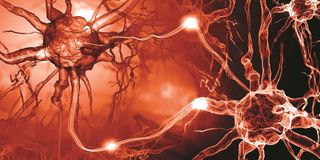Multiple sclerosis: Disease that plays hide-and-seek with body

Illustration of a nerve cell on a colored background with light effects.
What you need to know:
Symptoms may include:
- -Fatigue
- -Sexual dysfunction
- -Numbness, tingling or weakness of the arms or feet
- -Paralysis
Dear Doc,
What is multiple sclerosis? Please shed light on this.
Yours faithfully,
Alnashir D Walji
Nairobi
Dear Alnashir,
Multiple sclerosis (MS) is a chronic disease affecting the nervous system, specifically the spinal cord, the brain and the optic nerves.
In MS, the immune system attacks the myelin sheath, which is the lining covering the nerve fibres (similar to the plastic insulation covering electrical wires) or the nerve fibres themselves may also be attacked, leaving multiple scars along the nerve, hence the name multiple sclerosis. These attacks impair the functioning of the nerve fibres by interfering with conduction of nerve impulses. The disease can range from very mild with little or no symptoms, to severe and disabling disease.
For some people, the disease may gradually worsen over time, which is called primary progressive disease. For most, the disease has a short period of worsening of symptoms then a longer period of little to no disease activity, then another period of worsening symptoms and so on. This course of disease is called relapsing remitting.
In a few, the disease may thereafter worsen gradually, which is called secondary progressive disease. There are other rare courses of the disease. During periods of remitting, symptoms may resolve completely or partially, but in progressive disease, there is progressive disability.
There is no exact known cause of the damage to the nerve cells by the immune cells.
Risk factors associated with the illness include some genetic changes; having a sibling or parent with MS; being female; age between 20 and 40 years; vitamin D deficiency; obesity in females; having other autoimmune diseases; certain viral infections like Epstein-Barr virus (the virus causing mononucleosis); and being white, especially of north European descent. Smoking also increases the risk of disease progression, and having a fever or stress can trigger a relapse.
The symptoms depend on the exact location and the severity of the damage. Symptoms may include:
-Fatigue
-Dizziness
-Numbness, tingling or weakness of the arms or feet
-Poor coordination or unsteady gait
-Muscle spasms
-Paralysis
-Feeling of an electric shock sensation when moving the neck
-Eye problems: blurred vision, partial or complete loss of vision, pain when moving the eyes, double vision
-Sexual dysfunction
-Problems with bowel and bladder control
-Slurred speech
-Mood changes
-Insomnia
-Cognitive disturbances e.g. difficulties with memory, judgement and concentration
MS is usually a diagnosis of exclusion, meaning that it is diagnosed by first ruling out any other disease that may cause these symptoms. The tests done include blood tests, tests done on the spinal fluid, magnetic resonance imaging (MRI) and evoked potentials tests that record the electrical impulses produced by the nervous system in response to a stimulus.
MS has no cure, and treatments focus on reducing the severity of the attacks, slowing progression of the disease or preventing further relapses. Treatment should be prescribed by a neurologist, and may include corticosteroids, plasma exchange and disease modifying therapies. Other treatments include physical therapy to help with muscle weakness and coordination issues.
Other medications may target specific symptoms e.g. muscle relaxants, anti-depressants, pain medications to manage sexual dysfunction, bladder and bowel control, and medication to manage sleep difficulties. It is also necessary to get psychological and social support for the person suffering from MS plus for those caring for them.
Send your questions to [email protected]


